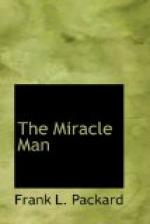“Good-night!” he nodded warmly.
The Patriarch, still with the quiet smile upon his lips, rose from his armchair, and, keeping his clasp on Madison’s hand, led Madison to the door, opened it, and with a gesture at once courtly and affectionate bade his guest good-night.
Madison crossed the lawn at a thoughtful pace, turned into the wagon track, and, in the shelter of the woods now, whimsically felt his pulse; then, lighting a cigar, tramped on with a buoyant stride.
“There’s only one answer, of course,” he mused. “The Patriarch’s got a brain kink on faith—it’s the natural outcome of living alone for sixty years. Outside of that and his books, he’s as simple and innocent and trusting as a babe. I suppose the thing’s kind of grown on him—Hiram said it had taken forty years—which isn’t sudden unless you say it quick. Hanged if I don’t like the old sport though, and if Helena isn’t the best ever to him I’ll stop her chewing gum allowance.” Madison looked up through the arched, leafless branches overhead. “Beautiful night, isn’t it?” said he pleasantly.
A little later he reached the main road and paused a moment on the bridge, as though to sum up the thoughts and imaginings that had occupied him on the way along.
“It’s a queer world,” said John Garfield Madison profoundly to the turbid little stream that flowed beneath his feet. “I wonder why some of us are born with brains—and some are born just plain damned fools!”
He went on again, arrived at the Congress Hotel, and, discovering through the window that the leading citizens of Needley were still in session, negotiated the back entrance. On the way upstairs he stumbled—quite inadvertently—and stopped to listen.
“There he be now,” announced Hiram Higgins’ voice excitedly. “Goin’ up to his room to meditate. Knew he’d come back feelin’ like that. I be goin’ out there to-morrow to see the Patriarch myself.”
Madison smiled, mounted the remaining stairs, entered his room, and lighted his lamp.
“Having got my hand in at writing,” he remarked, “I guess I’d better keep it up and write Helena—Vail.”
He extracted a pad of writing paper and an envelope from the tray of his trunk, his fountain pen from his pocket, and, drawing his chair to the table and laying down his cigar reluctantly at his elbow, began to write. At the end of fifteen minutes, he tilted back his chair, relighted the stub of his cigar, and critically read over his epistle.
“Dear Kid,” it ran. “Do not be anxious about me—I am feeling better already. Have had my first treatment, and am now eating fried eggs and ham regularly three times a day. A Sunday-school picnic taking to washboilers full of thin coffee and the left-over cakes kindly contributed by Deacon Jones’ household, is nothing to the way the boobs will take to the Patriarch—who has kindly consented to go blind to make our thorny paths as smooth as possible for us.




